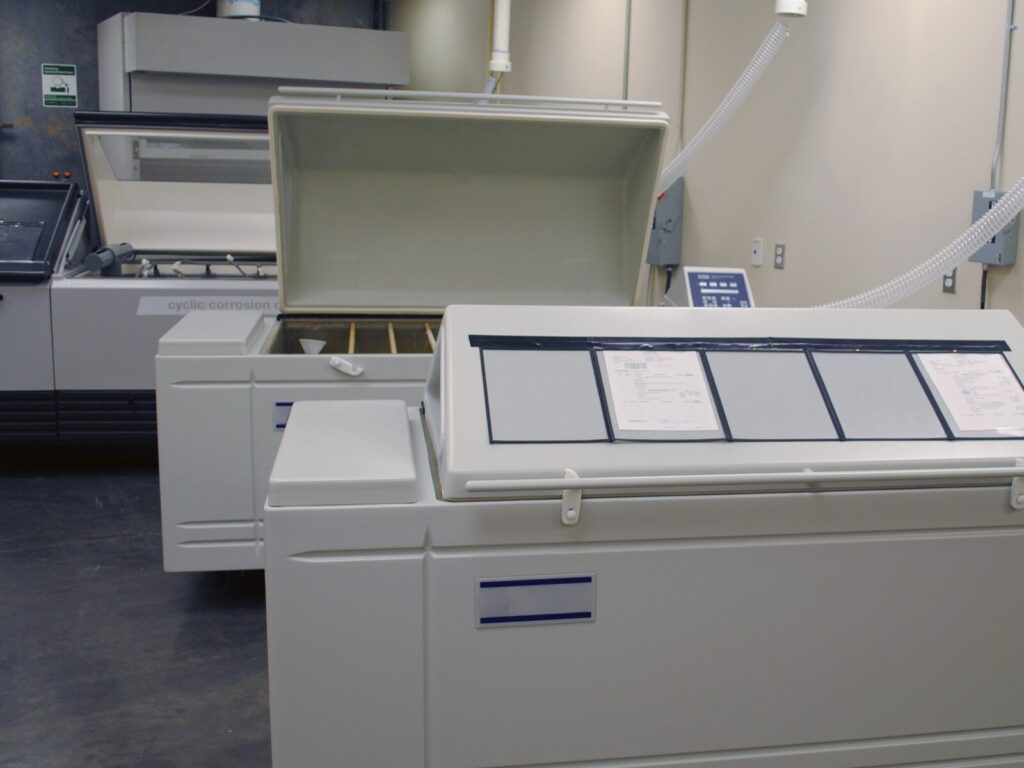Applied Technical Services offers salt spray resistance testing to help clients assess their materials’ resilience in corrosive environments. Corrosion is a major contributor to equipment failure, affecting everything from bridges and piping systems to hand tools and automotive components.
Salt spray testing, also known as salt fog testing, exposes samples to a controlled saline environment to measure their durability at an accelerated rate so clients know how corrosion-resistant their products or materials are before releasing them into service. This test method commonly serves to evaluate protective paints and surface coatings.
Salt Spray Methods
Standard salt spray testing uses a five percent solution of sodium chloride (NaCl) to test samples for corrosion resistance. More rigorous tests, such as CASS or AASS, augment the solution with chemicals such as copper chloride or acetic acid. Testing experts maintain precise control over the salt spray chamber’s conditions, such as pH and temperature. Testing may last anywhere between a few and a few thousand hours, depending on the client’s needs.
ATS offers both static and cyclic salt spray resistance tests. Static tests keep testing conditions constant, whereas cyclic tests expose test specimens to several distinct environments in a repeating cycle. Cyclic testing generally includes several phases: salt spray, drying, condensing humidity, and controlled temperature humidity.
ASTM B117 Practices
The ASTM B117 salt spray test standard specifies how to set up salt spray resistance tests in a way that produces consistent results in any lab or chamber. This standard practice outlines the parameters for creating a standardized corrosive environment. Numerous standards use the framework established in ASTM B117 to set up more specific tests.
ATS conducts testing according to the following standards that reference ASTM B117:
- ASTM G85
- ASTM D1735
- ASTM D2247
- MIL-STD 810 Method 509.4
- ISO 9227
- NES M 0140
- GM 4298P
- GM 9540
Salt Spray Testing Standards
Applied Technical Services’ salt spray testing lab conducts corrosion resistance tests according to a wide variety of standards. We have ISO/IEC 17025:2017 accreditation to perform many of these tests, including:
ASTM Standards
- ASTM G85 A3: SWAAT – Synthetic Sea Water Spray
- ASTM G85 A2: Salt Spray – Cyclic Acidified
- ASTM G85 A1: Salt Spray – Acetic Acid
- ASTM D2247: Condensing Relative Humidity
- ASTM D1735: Fogging Relative Humidity
- ASTM B368: CASS Test – Copper Accelerated Salt Spray
- ASTM B117: Salt Spray
ISO Standards
- ISO 9227: Acetic Acid Salt Spray
- ISO 9227: Salt Spray
- ISO 9227: CASS Test – Copper Accelerated Salt Spray
DIN Standards
- DIN 50021: Salt Spray
- DIN EN ISO 2409: Cross Cut Testing
SAE Standards
- SAE J 1563: Cyclic Salt Spray
- SAE J 400: Gravelometer
Ford Standards
- FLTM BO 116: Fogging
- FLTM B1-103: Salt Spray
GM Standards
- GM 9540P: Cyclic Accelerated Corrosion Testing
- GM 4298P: Salt Spray
- GM 4465P: Water Fog – Relative Humidity
- GMW 14872: Accelerated Corrosion Testing – Cyclic
We also perform several commonly requested evaluations in conjunction with corrosion resistance tests, such as:
- ASTM D610: Degree of Rusting
- ASTM D714: Degree of Blistering
- ASTM D1654: Rust Creepage on a Scratched Surface
- ASTM D3359: Coating Adhesion
If the service you need is not listed, contact ATS today for more information regarding our capabilities.
Weathering Testing with ATS
Applied Technical Services performs a wide range of weathering and corrosion tests in addition to salt spray resistance. Manufacturers need to know that their products and materials can withstand all the service conditions they will need to endure. We can evaluate their samples’ physical, thermal, and chemical properties, providing a comprehensive evaluation for clients to review.
We offer several forms of weathering testing, including:
- Color evaluations: how environmental factors impact product color and gloss
- Heat aging: accelerated aging process for a product or material to determine its capabilities during service
- Fluorescent UV: simulating the effects of solar radiation over time
- Altitude: how atmospheric variables (temperature, high pressure, and vacuum conditions) affect products and packaging
- Thermal shock: evaluating electronic components’ ability to withstand rapid temperature changes
- Temperature and humidity cycling: how products react to oscillating temperatures
- Xenon arc: exposing samples to cyclic radiation, filtered to closely resemble solar radiation, with optional humidity and spray factors
ATS: High-Quality Services
Applied Technical Services has provided clients with high-quality inspection, testing, and consulting engineering services since our founding in 1967. We are continually expanding our range of services and currently offer salt spray testing at multiple ATS locations. Our experts deliver detailed, accurate reports, ensuring that clients have a thorough understanding of their product or material’s qualities.
If you need salt spray resistance testing, contact ATS for a free quote.



